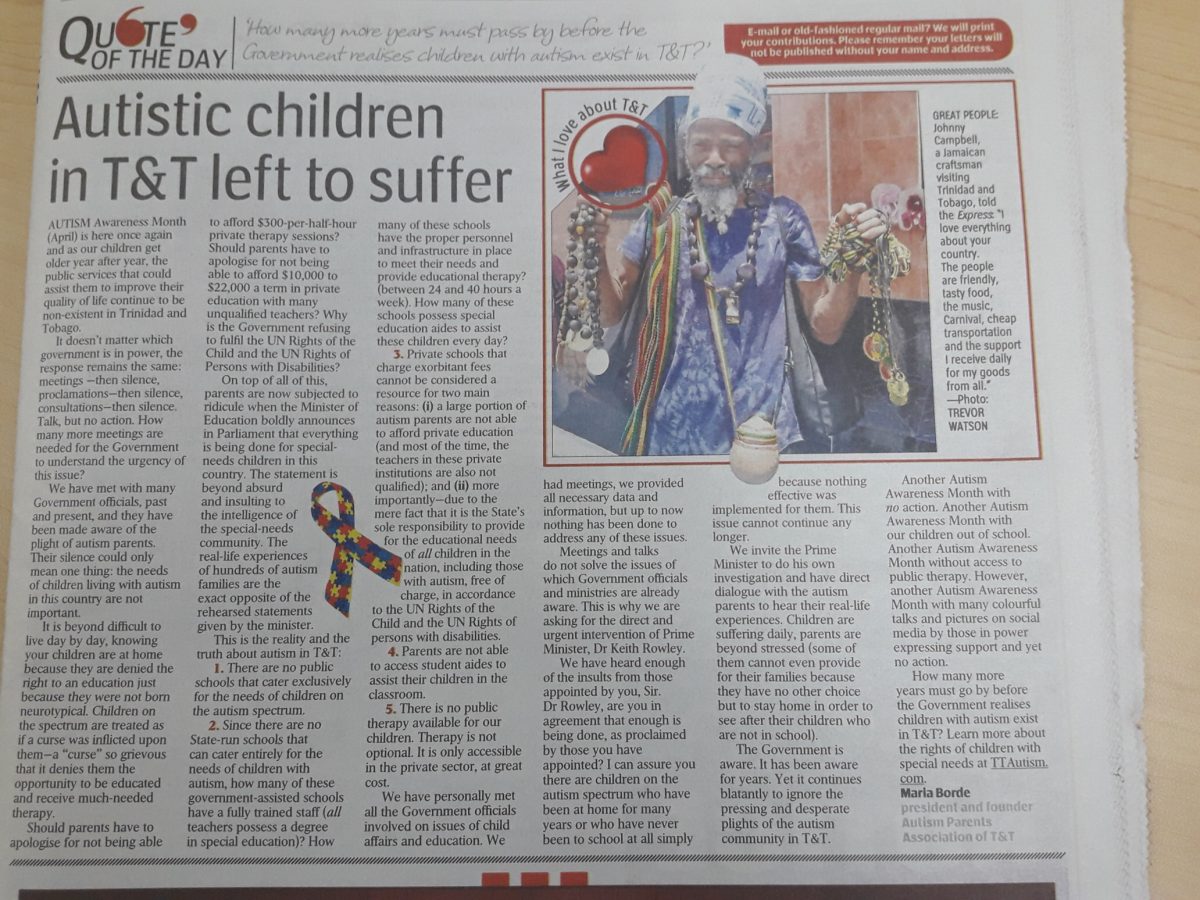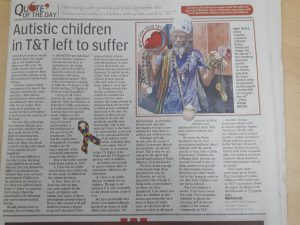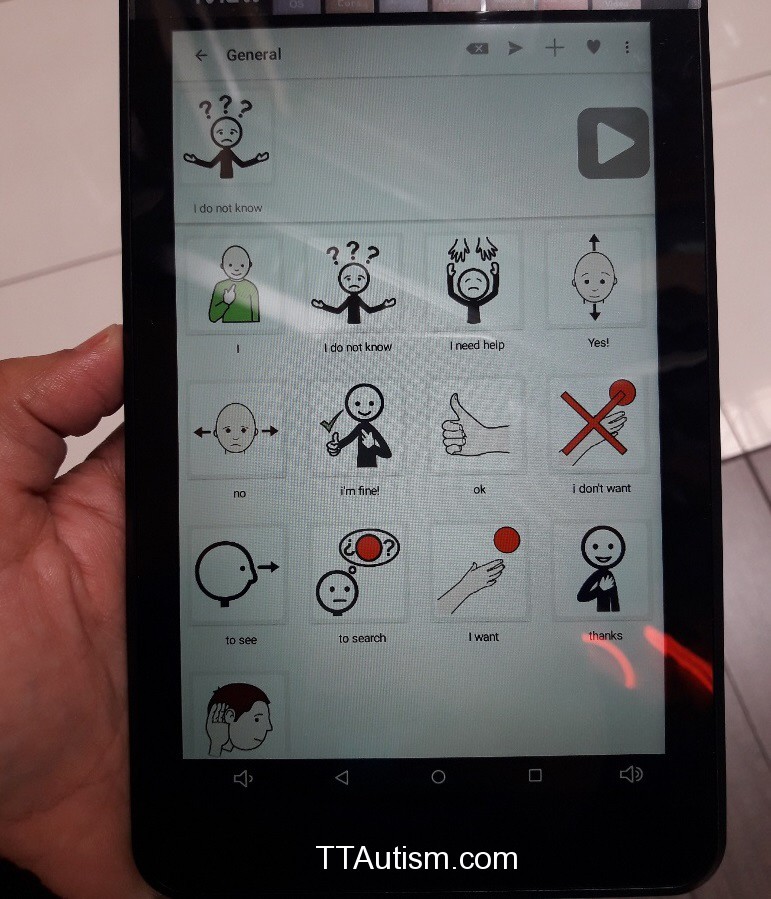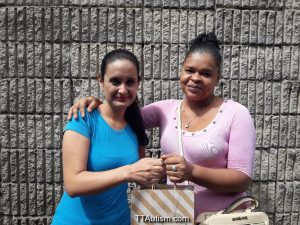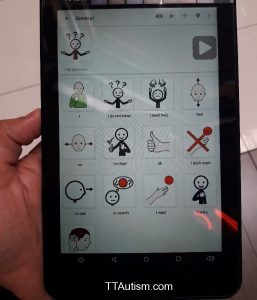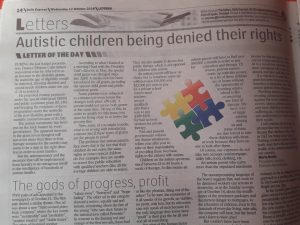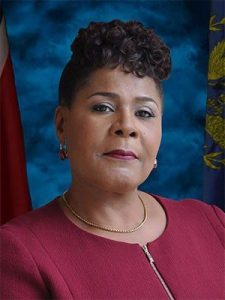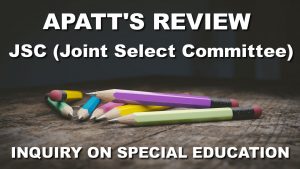
Purpose of meeting: To discuss special needs education as it relates to public, primary and the secondary schools. The objective is also to examine the effectiveness of current provisions and the policy measures that cater for the education of children with special needs in public, primary and the secondary schools.
The Ministry of Education (MOE) through the Acting Permanent Secretary Kurt Meyer stated that they welcome this opportunity to bring attention to the state of provision of services for one of the most important clients that they serve, children with special needs.
APATT: If Special needs children are one of the most important clients the Ministry of Education serve, why do parents have to constantly fight for their rights to receive an education in T&T? Embellishing words do not provide services.
According to the Chief Education Officer of Ministry of Education Mr. Harrilal Seecharan:
- 3,735 students require special education services (estimate number).
- 1,756 currently receive service.
- 1,631 students who they have confirmed diagnosis.
- 2,104 whose teachers would have indicated they suspected something.
- Figure does not include those outside the educational system.
- Figure not in collaboration with Central Statistical Office. MOE found that the definitions used in the criteria used for identifying students on through the CSO it eliminates a lot of the students they (MOE) consider with disabilities. (Leticia Rodriguez Cupid, coordinator for special education services).
APATT: Basically, the Ministry of Education does not possess official data on the amount of children who are in need of special education. They are estimating these figures based on teacher’s ability and willingness to report to the SSSD those students who might be on the radar for special education. Therefore, they do not and cannot represent the amount of children who are in need of services and the ones who are undiagnosed in the entire nation.
When asked by the committee if the classroom based interventions for the 1,979 students who have not been referred to the SSSD are in line with the requirement of the National Policy for persons with disabilities with regards to services listed on this policy (provision of adequate and appropriate professional support staff, assessment services and use of individualized educational plans for all students with disabilities) Leticia Rodriguez Cupid, coordinator for special education services admitted they are not. Ms. Cupid stated that the SSSD is a referral system and they must have parental and school input in the request for services. Given their limited resources, they respond as many as they can with the resources they have.
APATT: Limited resources? The SSSD according to the Minister of Education Anthony Garcia, are overstaffed by 500 employees. Where are those employees to assist on this particular matter? This is a direct admission from the Ministry of Education that they are not in line with National Policy for persons with disabilities with regards to services listed on the said policy.
- SSSD stated that they try not to eliminate the responsibility of care and educational delivery from the regular classroom teacher and if we are moving towards an inclusive society, the MOE take is that the classroom teacher has the first level of responsibility. (Leticia Rodriguez Cupid, coordinator for special education services).
APATT: Teachers in regular classrooms are not trained nor qualified to screen students who might have special needs therefore at this present time, they cannot have the first level of responsibility. Again, where are those 500 employees from the SSSD to assist on this issue?
- CODO (Consortium of Disability Organizations) stated that the figure presented does not include those who are currently in special needs schools and even those who have not been in any school. Therefore, statistically there is a serious problem. (CODO Vice-president, Bhawani Persad)
- CODO stated that WHO estimates for disabilities reads throughout the world bottom out of 10 or 11% for G20 countries. Trinidad based on resources should be higher. But if we look at 10% of a population of 1.4M people having disabilities, means there are right now 140,000 people with disabilities. So quoting a figure by the MOE of less than 4,000 children with disabilities give them immediately reason to pause and wonder precisely how these figures are come about and precisely what is being done to ensure that those who are not being counted can get the help they need. (CODO director, Tracy Hutchinson Wallace)
APATT: We fully agree with these concerns.
- MOE is looking into screening children from ECCE to the primary school system. Plan will take between 2 to 3 years. (Chief Education Officer Harrilal Seecharan)
APATT: Please pay attention to the first mention of the word “looking” in this inquiry. Unfortunately, the Ministry of Education has been a Ministry of just “looking” with regards to Special Education. This plan will take up to three years. What is the plan in the interim for students who need to be screened and they are lost in the current system?
- MOE stated that for private special needs schools they provide support for students through a student grant which was recently increased to $2,000. They provide support for teacher’s salaries and operational costs. For public special needs schools, the MOE provides funding through the normal route as the other primary schools. The MOE is looking at the funding arrangement they have with these schools because they recognize there are gaps on how they treat with students with special needs. (Chief Education Officer Harrilal Seecharan)
APATT: While children with Special Needs are trying to access educational services and while the Ministry of Education has been fully aware of the issues throughout the years (even through APATT), they are still “looking at” (second mention) how they can work things out.
Incognizance it is no longer an excuse. It is embarrassing that the body in charge of Education in Trinidad & Tobago will be in front of a committee and make such statement.
- The MOE stated there are issues with regards to psycho-educational assessments and they have been working in staffing 27 or 28 clinical and behavioral psychologists who are supposed to come on board to provide additional support. (Chief Education Officer Harrilal Seecharan)
APATT: Interesting the use of the word “supposed to”. So far, we have not seen any. APATT has reported in the past that personnel from the SSSD have told us that they only have TWO behavioral therapists for the entire country. Where are clinical and behavioral psychologists being sourced from, when exactly are they going to start working in the system and how? No details have been given by the Ministry.
- The MOE is also looking at the issue of funding for those students who require psycho-ed evaluations and can be provided support through the MOE. (Chief Education Officer Harrilal Seecharan)
APATT: Third mention of the words “looking at” with regards to funding psycho-ed evaluations. According to the SSSD, they have a waiting list of more than 300 students waiting to access services. “Looking at” on an issue that has been happening for many years is no longer acceptable.
- The MOE stated that the rights for students with special needs is addressed within the ministry under the general umbrella of ALL students having a right to education. (Chief Education Officer Harrilal Seecharan)
APATT: If that’s the case, what has the Ministry done besides having meetings about special education and “looking at” plans they don’t seem to implement or plan to implement anytime soon, particularly in a system where they allegedly are over 500 people overstaffed at the SSSD?
- The MOE recognizes there are students from mild to severe conditions. Mild and moderate might function in a classroom with some assistance while those who are severe might not. Therefore, the SSSD should work along with parents POSSIBLY through the special schools, to try to facilitate these children. (Chief Education Officer Harrilal Seecharan).
APATT: “Possibly” and “try” are not words that should be used by a Chief Education Officer during and inquiry and who believes that the “rights for students with special needs is addressed within the ministry under the general umbrella of ALL students having a right to education.”
- MOE: In the education policy of 2019-2023, they have targeted special education as an area for specific attention, revisiting staffing. They have had challenges with staffing, infrastructure of schools, and they are looking at how best they can address that. (Chief Education Officer Harrilal Seecharan).
APATT: Fourth mention of the words “Looking at” when referring to the rights of access to education of children with special needs. Staffing issues even though the Minister of Education has clearly stated they are overstaffed by 500 employees.
The SSSD have been in existence for fifteen years. Fifteen years of “looking at” plans that do not seem to materialize and meetings without the proper feedback from parents of special needs children who should be heavily involved in discussions with the Ministry about special education of their children.
- When MOE was asked for number of persons trained and how many persons with disabilities have been recruited into the system by the Ministry, the Chief Educational Officer stated he has not quantified the numbers of persons. He also stated the same about how many persons with disabilities have been recruited by the Ministry. And that he can get the numbers and provide those to the committee.
APATT: Very alarming that in an inquiry about Special Education, the Chief Education Officer could not state the number of persons trained as well how many persons with disabilities have been recruited by the Ministry of Education.
- Leticia Rodriguez Cupid (coordinator for special education services) stated they have interviewed several persons with disabilities including persons with visual impairment, persons who are blind and persons who are deaf and hard of hearing. They have one special education instructor who is deaf currently employed on contract. They have several other persons with varied challenges employed by the MOE. They have had in the past teachers who are blind and visually impaired.
APATT: The coordinator for Special Education services took a while to think of ONE person with disabilities employed in the Ministry of Education. Even though a mention was given of “several other persons”, no numbers were provided. This lack of information coming from the coordinator for Special Education services is also very concerning.
- Since the SSSD formation (15 years ago) one of their mandates has been to offer training for the general educational teachers throughout the school system in the area of special education. They have offered this training at the school based level and district level, on the identification of special needs in the classroom, they have been supporting teachers with the use of checklists and screening materials to identify the characteristics of the disability, not to identify the need or to diagnose, but at least to be able to indicate to the SSSD that these children are of concern to them. (Leticia Rodriguez Cupid, coordinator for special education services). Since 2010 they have been offering training during the July/August vacation.
APATT: We would like to know exactly (besides the once a year training taking place during the July-August vacation) how many training workshops have taken place in every school and district, the content of these workshops and the amount of teachers who have been the recipient of these trainings.
- Hazel Thompson-Ahye stated that she noted from the MOE the term “incremental steps” and remarked that “while the grass was growing the horse was starving and some have died.”
APATT: We fully agree with the proverbial quote by Ms. Hazel Thompson-Ahye. Our children are “starving” for the opportunity to access public education with many who have never set foot in a school in T&T.
- The MOE was asked by Ms. Thompson-Ahye in reference to payment of salaries and operational costs in special needs schools if they consider it adequate in terms of the consistency of payment of teachers in these special needs schools. The MOE responded by stating that teachers within public special needs schools get paid like regular teachers within the system. Those who are teachers in private special needs schools are supported by the MOE through the grant received by the special needs school. It doesn’t cover 100% the cost of the salary because a lot of these schools are schools where they charge fees for the students. Chief Educational Officer could not provide exact figure.
APATT: Another instance where the Chief Educational Officer could not provide exact figures.
- Leticia Rodriguez Cupid, coordinator for special education services stated that the salaries of private special needs schools were increased and improved in keeping with general qualifications. Salaries not 100% on par with public service but it is much closer to that level.
- The MOE stated that in their referral and intervention process they function internally as part of a multidisciplinary team where they have social workers guidance officers, special educators working collaboratively along with psychologists and behavioral specialists.
APATT: If their team encompasses psychologists and behavioral specialists, why is the Ministry of Education lacking these professionals to serve children with Special Needs in T&T? The SSSD has been in existence for fifteen years to now come to the conclusion that they need these professionals on the field? Absolutely unacceptable.
- When asked what is the average waiting period for a student to be assessed by the SSSD for learning or behavioral disorders, Leticia Rodriguez Cupid, coordinator for special education services stated it varies between 6 months to a year depending on the referral process.
APATT: It has been very disconcerting and alarming to read that the Coordinator for Special Education Services believes that the waiting period for an assessment done through the SSSD is 6 to 12 months when in reality children are waiting years to be assessed by the SSSD.
In our last meeting with their personnel, as we have stated previously, they have over 300 children on a waiting list. Our parents report longer periods and many have never been called. These statements are purposely misleading and parents of Special Needs Children will not remain quiet about it.
The MOE was asked what would be the outcome of a situation where a child was diagnose at a very late stage prior to setting up examinations and of course this would affect the performance of the student in the exam. Ms. Thompson-Ahye asked again if they ever had cases like that or are the stories you read in the press are fantasies.
The Chief Educational officer stated that one of the things he found very interesting is that they have students who are in the system functioning and then coming to SEA, they have a host of requests for concession which they treat with and in fact is one of the processes that he is satisfied with in terms of the ministry’s ability to handle this area. He believes many of these diagnoses would come in late because people are now looking for concessions during exams.
APATT: In this part of the inquiry, the Chief Education Officer hinted that he believes parents are using the concession for their children to take advantage over the SEA exam. Later on, he will directly admit he believes they are doing so.
It is appalling that he stated that he is satisfied with in terms of the Ministry of Education ability to handle Special Concessions during exams. What is he exactly satisfied with?
The fact that children who have been diagnosed having Special Needs and possess medical reports to prove it have been denied Special Concessions by the Ministry of Education or the fact that the Ministry of Education provides feedback late to parents before the SEA exam, causing great anxiety and stress to those who are supposed to receive accommodations on a timely manner?
Are these things to be satisfied with? It is absolutely unacceptable that parents have to submit applications with TWO years in advance to access concessions and then be told their applications have been rejected.
- Tracy Hutchinson Wallace stated that there are children in the school system for 7 or 8 or more years under the radar of the MOE who still get denied even though they applied on time.
APATT: We fully agree with this and this is the feedback we get from our parents.
- Chief Educational Officer stated that about concessions, they have a team set up, a cross-functional team and in terms of ensuring fairness in the process, there is also an external person qualified who sits as part of that team. Each case is treated on a case by case basis.
He said that the issue of persons being denied and apparently there are those who can pay more, can get many assessments done. He stated that they found over the years that there are a number of persons who seek to get an advantage by providing evidence. They get persons who can pay certain professionals to get one (concession) very often they have some of those.
APATT: This is the part where the Chief Educational Officer have stated that there are parents who are paying professionals to get a report stating their child has special needs in order to take advantage over the exam.
This is a disturbing claim and insult to the highest form to parents of Special Needs Children in T&T. The Chief Education Officer is clearly stating that there are unscrupulous parents who are willing to pay corrupted professionals to lie on the report in order for their children to have a few minutes more to complete the SEA exam.
We challenge the Chief Educational Officer to provide evidence of those claims immediately or cease making such outrageous remarks about Special Needs Parents.
These parents already go through the serious, daily challenges associated with the lack of resources available for their children and they have now become the “scapegoat” of the Ministry of Education’s incompetence of providing and properly addressing the Special Concessions needed for Special Needs students.
The arrogance manifested by the Ministry of Education to Special Needs Parents on this issue will not be tolerated.
- NPTA chairman Raffiena Ali-Boodoosingh stated that there are children within the system referred to from the infant department and they may leave the whole primary school system and never get service from SSS.
APATT: We fully agree with this as it have been the reports we have received from parents.
Ministry of Social Development deputy permanent secretary Vijay Gangapersad stated they are in the process of transitioning the children who are on receipt of public assistance or the special child grant to the disability assistance grant.
A medical report has been developed in collaboration with the Ministry of Health to allow them to zero in the children who require this kind of support. He stated that in March 2018, the Ministry introduced a new system, a new targeting mechanism for the public assistance grant (which is a pro-poor program) and it did make some concessions in terms of deductions that were allowable for all medical expenses associated with a person as well as for housing accommodation.
The persons who would have failed the means test were the ones that were removed from the program but they were removed from public assistance and efforts were being made to transition these children in the interim to the special child grant which is not administered in accordance with the means test.
APATT: Since this medical report has been already developed, we would like to know what exactly is in this report and if/how it is going to be utilized to zero in the children who require the disability assistance grant.
- Ministry of Social Development deputy permanent secretary Vijay Gangapersad stated they have received approval of cabinet and are in the process of printing the forms for the new grant to make it available this month. It is going to be implemented from this month.
So those persons who they have been removed can now access the grant. Those persons who are currently on public assistance as well as the special child grant, they (ministry) have now the approval to transition those children to the disability assistance grant. This new grant will be $1,500 and there will be no means test.
APATT: Will this new form ask the ridiculous question “Is your child still autistic?” We look forward to the report given by parents when this new grant becomes accessible and if there will be no means test given to parents since we have had reports by parents in the past that the former Special Needs Child grant was subjected to a means test.
The last grant has been discontinued since last year with many parents struggling to make ends meet. It has been over a year.
- Equal Opportunity Commission stated that in 2017, they have received a total of 145 complaints with regards to special needs children not able to get into schools. In 2018, a total of 132 and up to March 2019, a total of 45.
APATT: What are the Ministries of Education and Social Development & Family Services exactly doing about addressing these complaints?
- Plans of the Ministry of Social Development and Ministry of Health to provide services through health centers. (Ongoing discussion stage). When asked how many meetings they had with the Ministry of Health about this issue, they could not provide the number of meetings.
APATT: It seems like the Ministry of Social Development & Family Services like the Ministry of Education engage in many discussions and yet they cannot provide how many meetings they have had.
We would like to know the nature of these meetings and the concrete outcome (actions taking place) from these meetings as we have observed throughout the years, that those in authority or in charge of creating change for Special Needs Children seem to have been in a perpetual state of meetings and dialogue for many years without actions taking place to address these issues.
- MOE stated that student aides continue to be sourced through the Ministry of Labour via the OJT program. They were asked how the OJT personnel are qualified to carry out the duties of a student aide.
Leticia Rodriguez Cupid (coordinator for special education services) stated that in the recruiting process, student aides are not meant to be professionals in the field but to provide a specific support service. They look for interested persons who are willing to work with persons with disabilities.
They provide in-house training before they are allowed to go on the field so once they are assigned to SSS, their district officers, special education professionals who are in charge of the child’s individualized plan or intervention plan would meet with that aide to ensure that the aide is clear on his or her mandate to work with the child for a particular reason and what is required of the aide it varies. The aide is not required to teach but to provide a support. Through the OJT program they have just over 300 student aides.
APATT: How can it be possible that personnel who are supposed to support students with special needs in the classroom are not meant to be professionals in the field? It is a disturbing and very concerning statement by the coordinator for Special Education services.
In our last meeting with SSSD personnel they could not tell us exactly what these in-house trainings are about and how they are carried out. This is coming from the body in charge of Special Needs Education in T&T.
- TTUTA stated that teachers say there are not enough student aides. They recommend an increase of student aides.
APATT: We agree with TTUTA with the addition that we believe student aides should be properly qualified to support the needs of the Special Needs child in a classroom setting.
- CODO stated that we should have around 250 occupational therapists according to their organization and the WHO. We have only 1 developmental pediatrician working in the country.
APATT: There is a clear lack of professionals that can cater for the needs of Special Needs children. One developmental pediatrician for a population of 1.3 million inhabitants. Let that sink in.
- MOE fully endorses inclusion. Their vision is that every teacher will become a special educator with skills to address the children in the classroom.
APATT: The Ministry of Education’s vision is not supported by the present lack of action of any kind taking place right now for Special Education in T&T.
- MOE is looking at clustering schools within districts where students who have these special needs can go to, where they will provide additional resources.
APATT: Fifth mention of the words “looking at”. Basically, they have nothing in place. No details were given about these schools, districts and how exactly these resources will be provided. Another “looking at” approach by the Ministry of Education.
- When asked to the MOE and Ministry of Social Development what kind of collaboration they have to support children with special needs through the health centers right now without having to pay exorbitant fees. Ministry of social development stated there is a need for more dialogue and they lack robust data.
APATT: The answer and admission by the deputy permanent secretary of the Ministry of Social Development & Family Services is also very concerning because it hinted a clear lack of dialogue. These two ministries should be collaborating hand in hand to provide services to children with Special needs.
- Tracy Hutchinson Wallace stated that the policies and programs designed by persons who don’t have “skin in the game”, meaning they are not the people who are accessing these services, they are not the people who are having difficulties accessing the services, they are not the ones directly affected when the services are not adequate and are not appropriate and are not available.
They would like to see much more of the design of the policy and discussions of policies and initiatives with CODO and with their members so they can find out precisely what persons with disabilities need as opposed to what is happening now where there is a lot of theory about what is needed but there is very little discussion with the people who are actually have to use the services that are being offered.
APATT: We fully agree with Mrs. Tracy Hutchinson Wallace about policies created by those who do not have “skin in the game”. We believe there is a clear lack of discussion and unwillingness by the part of the Ministry of Education particularly to discuss these issues with those who matter, meaning those who are in need of accessing these services for themselves or their family members.
APATT would like to thank all those who contributed with real facts on the present state of Special Education in T&T. A special mention and thanks to Mrs. Tracy Hutchinson Wallace and Ms. Hazel Thompson-Ahye for their valuable contribution in this inquiry.
We believe without their particular input and questions they have raised, this meeting would not have brought up the fact that children with Special Needs are not being catered for in the present educational system and that constant “plans” for Special Education does not equate in any way, shape or form to concrete actions to address the pressing issues of children with Special Needs in T&T.
Note: Full video of the meeting can be seen here: Inquiry

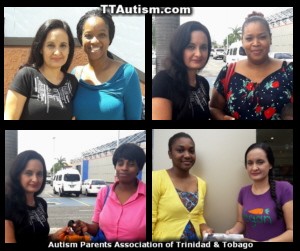
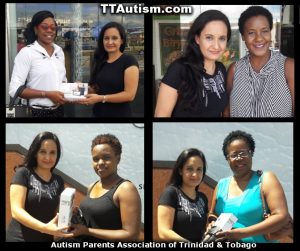
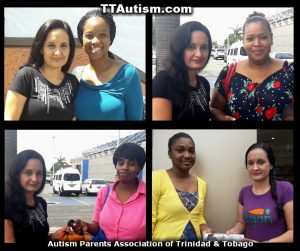


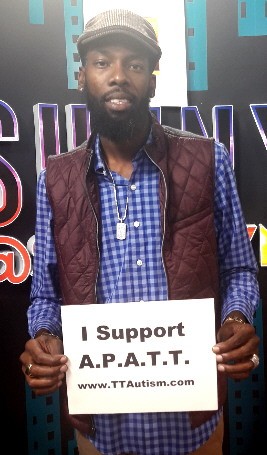
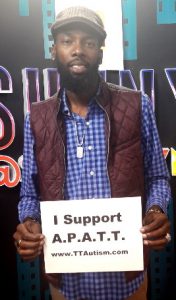 Today, we were invited to an interview with Sunny Bling from the Sunny@Sundown CNC3 show.
Today, we were invited to an interview with Sunny Bling from the Sunny@Sundown CNC3 show.

